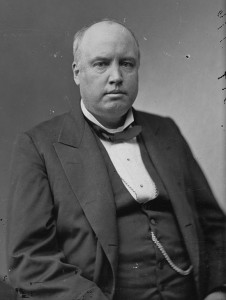“Liberty is the Child of Intelligence”: Why We Celebrate Robert G. Ingersoll Day

Last week, ten presidential hopefuls from the Republican Party gathered together for an event that was more like reality TV than a serious political debate. The art of a true debate, in which ideas are thoughtfully exchanged through reason and logic, seemed lost in favor of personal attacks, accusations, and outlandish declarations. This media spectacle would almost be funny if not for the possibility that someone in such a group may become the next US President. Our nation sadly seems to be in need of a reminder of the role that truly great oratory can have on challenging people’s assumptions, empowering them to think critically, and inspiring them to imagine new possibilities—that’s why we need Ingersoll Day.
Ingersoll Day is a little-known holiday, celebrated on August 11 to honor the birthday and accomplishments of Robert Green Ingersoll (1833-1899), the man nicknamed “the Great Agnostic.” In his day, Ingersoll was known not only for his skepticism of God’s existence but also for his engaging, rousing speeches, which could cover topics from philosophy and literature to America’s Reconstruction after the Civil War and Charles Darwin’s theory of evolution. Truly a renaissance man in his broad knowledge about an array of subjects, Ingersoll drew impressive crowds who appreciated both the entertainment and the education that he offered with his talks.
Given his commitment to humanism and rationalism, today’s readers might be surprised to learn that Ingersoll made his career as a Republican politician. However, the Republican Party of Ingersoll’s time was far more progressive and intellectually rigorous than today’s party of simpering Sarah Palin and boisterous Bill O’Reilly. Ingersoll, who once said that “there is no slavery but ignorance” and that “liberty is the child of intelligence,” would likely be appalled at the slander and deceit spread by Fox News. Ingersoll was an advocate for the eight-hour working day, women’s right to vote, and civil rights for African Americans. While some of his ideas may seem backward to humanists today, they were revolutionary for their time and laid the groundwork for our contemporary progressive movement.
Also unlike today’s GOP, Ingersoll was a staunch defender of the complete separation of church and state. Mike Huckabee and Rick Perry might believe that our Founding Fathers were fundamentalist Christians, but Ingersoll sagely asserted in a speech in 1890 that “in 1776, our fathers endeavored to retire the gods from politics.” In this speech, Ingersoll describes battles that humanists are still fighting, including the need to remove “In God We Trust” from our currency and the pernicious problem of legislative prayer.
Unlike Rick Santorum and Bobby Jindal’s incessant pandering to the religious right, Ingersoll seized every opportunity he had to skewer religion and its illogical dogmas. In a humorous 1897 speech about Christmas, he calls for “the Pope [to] throw away his tiara, take off his sacred vestments, and admit that he is not acting for God—[and he] is not infallible.” He frequently accused the Bible of being an immoral book, pointing out that “Christ cared nothing for painting, for sculpture, for music—nothing for any art. He said nothing about the duties of nation to nation, of king to subject; nothing about the rights of man; nothing about intellectual liberty or the freedom of speech.”
And unlike Donald Trump, who probably isn’t religious but is making some small efforts to seem as though he is, Ingersoll freely admitted that he didn’t know if a higher power existed but that he “became convinced that the Universe is natural—that all the ghosts and gods are myths,” adding that this lack of belief was not meaningless but was, in fact, a source of freedom and joy.
Given Ingersoll’s candid views on church/state separation, the weaknesses of the clergy, the atrocities in the Bible, and the evidence against a deity’s existence, it’s sadly unsurprising that those outside of the humanist community would choose to forget his legacy. However, the disregard for Ingersoll’s witty and rational arguments seems linked to the ravings of last week’s Republican candidates. We seem to care more about shock value than we do about reason, and we’re more likely to tune in to trivial name-calling than we are to thoughtful, logical conversation. David Niose, the American Humanist Association’s legal director, has written extensively on the growing anti-intellectualism in the United States and the deterioration of our political discourse is just one problem associated with it. Humanists, with our emphasis on reason and critical thinking, should be deeply concerned by this crisis and strongly advocate for logic and rationality to guide our nation’s public discourse. We can start by honoring and encouraging celebration of Ingersoll Day.
